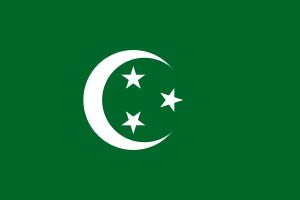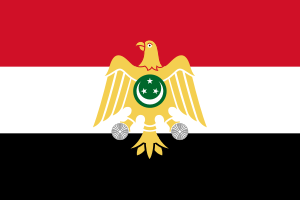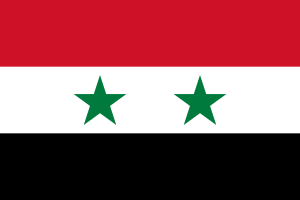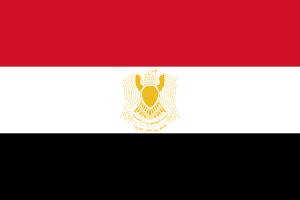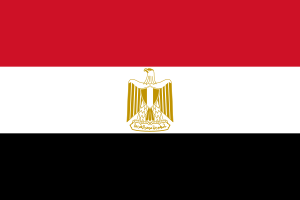Flag of Egypt facts for kids
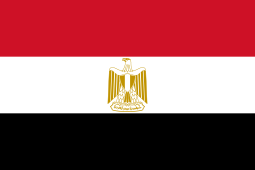 |
|
| Name | Egypt |
|---|---|
| Use | Civil and state flag, civil and state ensign |
| Proportion | 2:3 |
| Adopted | October 4, 1984 |
| Design | Horizontally divided red-white-black tricolor flag with the Eagle of Saladin. |
| Designed by | Aly Kamel El-Deeb |

Variant flag of Arab Republic of Egypt
|
|
| Use | Civil flag and ensign |
| Proportion | 2:3 |
| Design | Variant of the national flag without the Eagle of Saladin. |
| Designed by | Aly Kamel El-Deeb |
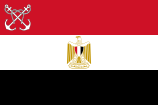
Variant flag of Arab Republic of Egypt
|
|
| Use | Naval ensign |
| Proportion | 2:3 |
| Adopted | October 4, 1984 |
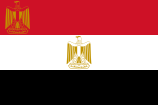
Variant flag of Arab Republic of Egypt
|
|
| Name | Presidential Standard of Egypt |
| Proportion | 2:3 |
| Adopted | October 4, 1984 |
| Design | National flag with gold outlined Eagle of Saladin in canton. |

The flag of Egypt (Arabic: عَلَمْ مِصر) is a special symbol for the country. It has three equal stripes: red, white, and black. In the middle white stripe, you'll see a golden eagle. This flag design comes from the Egyptian Revolution in 1952, when a group called the Free Officers changed Egypt's government.
What the Colors Mean
In 1952, the Egyptian Free Officers wanted to give special meanings to the flag's colors.
- The red stripe stands for the bravery and sacrifices of Egyptians in their fight against being ruled by other countries.
- The white stripe represents the pure hearts of the Egyptian people.
- The black stripe at the bottom shows how darkness and hard times can be overcome.
This flag design was so inspiring that many other Arab countries, like Iraq, Syria, Sudan, and Yemen, also used similar flags. The main difference is often just the symbol in the middle white stripe.
A Look at the Colors
| Red | White | Black | Gold |
|---|
How the Flag Changed Over Time
The flag of Egypt has changed many times throughout history. These changes often happened because of important events, like new rulers or big political shifts.
Early Flags (1805–1922)
When Muhammad Ali took control of Egypt in 1805, Egypt was part of the Ottoman Empire. But Muhammad Ali and his family ruled Egypt almost like an independent country. They used a red flag with three white stars and crescents. Some people believe the three stars and crescents showed his victories in Africa, Asia, and Europe. It also showed his rule over Egypt, Sudan, and Hejaz. This flag looked similar to the flag of the Ottoman Empire because Muhammad Ali hoped to become the Ottoman ruler himself.
Egypt kept this flag even after the Ottoman Empire's rule officially ended in 1914. At that time, Egypt became a sultanate under British protection.
After 1882, British forces took over Egypt. This made many Egyptians want their country to be truly independent. During the Revolution of 1919, people protested against the British. They used Muhammad Ali's red flag and a special green flag with a crescent and a cross. The green flag showed that both Muslims and Christians in Egypt were united against the British.
-
 Flag used in Egypt during the rules of Isma'il Pasha and Tewfik Pasha (1867–1881).
Flag used in Egypt during the rules of Isma'il Pasha and Tewfik Pasha (1867–1881). -
 Flag of the Khedivate of Egypt (1881–1914) and the Sultanate of Egypt (1914–1922).
Flag of the Khedivate of Egypt (1881–1914) and the Sultanate of Egypt (1914–1922).
The Kingdom of Egypt Flag (1922–1953)
In 1922, the United Kingdom agreed to recognize Egypt as an independent country. However, they had a condition: the Sultan of Egypt, Fuad I, had to change his title to King. When he became King, Fuad I officially adopted a new national flag. This flag was green with a white crescent and three white stars.
The three stars on this flag represented the three main parts of the Kingdom: Egypt, Nubia, and Sudan. The green color showed that Egypt was an agricultural country. Some also say it represented Islam, the main religion. Another idea is that the three stars stood for the three main religious groups in Egypt: Muslims, Christians, and Jews.
The Egyptian Revolution Flag (1953–1958)
After the 1952 Revolution, the Free Officers kept the old Kingdom flag for a short time. But they also introduced a new "Revolutionary and Liberation" flag. This flag had the red, white, and black stripes, with the Eagle of Saladin in the middle white stripe. This eagle was a symbol of the revolution.
Even when Egypt officially became a Republic in 1953, the old Kingdom flag was still used. But in 1958, Gamal Abdel Nasser announced a new union called the United Arab Republic. The new flag showed a clear break from the older flags that were inspired by the Ottoman Empire. It highlighted the idea of Arab unity that Nasser supported.
The United Arab Republic Flag (1958–1972)
In 1958, Syria and Egypt joined together to form the United Arab Republic (UAR). They adopted a new flag based on the Egyptian Liberation flag. This flag had two green stars in the white stripe instead of the eagle. These two stars represented Egypt and Syria, the two countries in the union. Even though Syria left the union in 1961, Egypt continued to use this flag until 1971. Today, the flag with two green stars is still used as the national flag of Syria.
Colors of the UAR Flag |
Red | White | Green | Black |
|---|
The Federation of Arab Republics Flag (1972–1984)
In 1972, Egypt, Syria, and Libya formed a new group called the Federation of Arab Republics. They adopted a common flag, which was again based on the Arab Liberation flag. This time, the two green stars in the white stripe were replaced by the Hawk of Qureish. This hawk had been the symbol for Syria before the UAR was formed.
Colors of the Federation Flag |
Red | White | Black | Gold |
|---|
The Current Egyptian Flag (1984–present)
The Federation of Arab Republics ended in 1977, but Egypt kept using its flag until October 4, 1984. On that date, the golden Hawk of Qureish was replaced by the Eagle of Saladin. This is the same eagle you see on the flag today.
When the Flag is Used
The Egyptian flag is flown on all government buildings on Fridays, national holidays, and during important meetings of the House of Representatives. It is also flown every day at border crossings, customs offices, and Egyptian embassies in other countries. When the Egyptian President visits another country, the flag is also flown there.
It is against the law to disrespect the flag in any way. This is because the flag represents the power and honor of the country. There are also laws against disrespecting the flags or symbols of other nations.
See also
 In Spanish: Bandera de Egipto para niños
In Spanish: Bandera de Egipto para niños
- Coat of arms of Egypt
- Flags of the Egyptian Armed Forces
- List of Egyptian flags
- Pan-Arab colors
- Flag of Iraq
- Flag of Sudan
- Flag of Syria
- Flag of the United Arab Emirates
- Flag of Yemen
 | Calvin Brent |
 | Walter T. Bailey |
 | Martha Cassell Thompson |
 | Alberta Jeannette Cassell |






